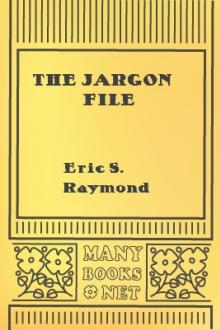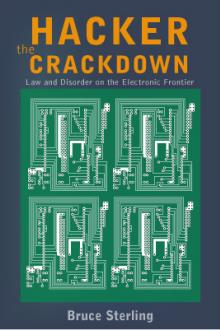The Jargon File by Eric S. Raymond (ebook reader android txt) 📕

- Author: Eric S. Raymond
- Performer: -
Book online «The Jargon File by Eric S. Raymond (ebook reader android txt) 📕». Author Eric S. Raymond
to snatch the error code from the trap frame, it will be time for you
to leave."
Hackers
Steven Levy
Anchor/Doubleday 1984
ISBN 0-385-19195-2
Levy's book is at its best in describing the early MIT hackers at the
Model Railroad Club and the early days of the microcomputer
revolution. He never understood Unix or the networks, though, and his
enshrinement of Richard Stallman as "the last true hacker" turns out
(thankfully) to have been quite misleading. Despite being a bit dated
and containing some minor errors (many fixed in the paperback
edition), this remains a useful and stimulating book that captures the
feel of several important hacker subcultures.
The Computer Contradictionary
Stan Kelly-Bootle
MIT Press, 1995
ISBN 0-262-61112-0
This pastiche of Ambrose Bierce's famous work is similar in format to
the Jargon File (and quotes several entries from TNHD-2) but somewhat
different in tone and intent. It is more satirical and less
anthropological, and is largely a product of the author's literate and
quirky imagination. For example, it defines `computer science' as "a
study akin to numerology and astrology, but lacking the precision of
the former and the success of the latter" and `implementation' as "The
fruitless struggle by the talented and underpaid to fulfill promises
made by the rich and ignorant"; `flowchart' becomes "to obfuscate a
problem with esoteric cartoons". Revised and expanded from "The
Devil's DP Dictionary", McGraw-Hill 1981, ISBN 0-07-034022-6; that
work had some stylistic influence on TNHD-1.
The Devouring Fungus: Tales from the Computer Age
Karla Jennings
Norton, 1990
ISBN 0-393-30732-8
The author of this pioneering compendium knits together a great deal
of computer- and hacker-related folklore with good writing and a few
well-chosen cartoons. She has a keen eye for the human aspects of the
lore and is very good at illuminating the psychology and evolution of
hackerdom. Unfortunately, a number of small errors and awkwardnesses
suggest that she didn't have the final manuscript checked over by a
native speaker; the glossary in the back is particularly embarrassing,
and at least one classic tale (the Magic Switch story, retold here
under [15329]A Story About Magic in Appendix A is given in incomplete
and badly mangled form. Nevertheless, this book is a win overall and
can be enjoyed by hacker and non-hacker alike.
The Soul of a New Machine
Tracy Kidder
Little, Brown, 1981
(paperback: Avon, 1982
ISBN 0-380-59931-7)
This book (a 1982 Pulitzer Prize winner) documents the adventure of
the design of a new Data General computer, the MV-8000 Eagle. It is an
amazingly well-done portrait of the hacker mindset -- although largely
the hardware hacker -- done by a complete outsider. It is a bit thin
in spots, but with enough technical information to be entertaining to
the serious hacker while providing non-technical people a view of what
day-to-day life can be like -- the fun, the excitement, the disasters.
During one period, when the microcode and logic were glitching at the
nanosecond level, one of the overworked engineers departed the
company, leaving behind a note on his terminal as his letter of
resignation: "I am going to a commune in Vermont and will deal with no
unit of time shorter than a season."
Life with UNIX: a Guide for Everyone
Don Libes and Sandy Ressler
Prentice-Hall, 1989
ISBN 0-13-536657-7
The authors of this book set out to tell you all the things about Unix
that tutorials and technical books won't. The result is gossipy,
funny, opinionated, downright weird in spots, and invaluable. Along
the way they expose you to enough of Unix's history, folklore and
humor to qualify as a first-class source for these things. Because so
much of today's hackerdom is involved with Unix, this in turn
illuminates many of its in-jokes and preoccupations.
True Names ... and Other Dangers
Vernor Vinge
Baen Books, 1987
ISBN 0-671-65363-6
Hacker demigod Richard Stallman used to say that the title story of
this book "expresses the spirit of hacking best". Until the subject of
the next entry came out, it was hard to even nominate another
contender. The other stories in this collection are also fine work by
an author who has since won multiple Hugos and is one of today's very
best practitioners of hard SF.
Snow Crash
Neal Stephenson
Bantam, 1992
ISBN 0-553-56261-4
Stephenson's epic, comic cyberpunk novel is deeply knowing about the
hacker psychology and its foibles in a way no other author of fiction
has ever even approached. His imagination, his grasp of the relevant
technical details, and his ability to communicate the excitement of
hacking and its results are astonishing, delightful, and (so far)
unsurpassed.
Cyberpunk: Outlaws and Hackers on the Computer Frontier
Katie Hafner & John Markoff
Simon & Schuster 1991
ISBN 0-671-68322-5
This book gathers narratives about the careers of three notorious
crackers into a clear-eyed but sympathetic portrait of hackerdom's
dark side. The principals are Kevin Mitnick, "Pengo" and "Hagbard" of
the Chaos Computer Club, and Robert T. Morris (see [15330]RTM, sense
2) . Markoff and Hafner focus as much on their psychologies and
motivations as on the details of their exploits, but don't slight the
latter. The result is a balanced and fascinating account, particularly
useful when read immediately before or after Cliff Stoll's [15331]The
Cuckoo's Egg. It is especially instructive to compare RTM, a true
hacker who blundered, with the sociopathic phone-freak Mitnick and the
alienated, drug-addled crackers who made the Chaos Club notorious. The
gulf between [15332]wizard and [15333]wannabee has seldom been made
more obvious.
Technobabble
John Barry
MIT Press 1991
ISBN 0-262-02333-4
Barry's book takes a critical and humorous look at the `technobabble'
of acronyms, neologisms, hyperbole, and metaphor spawned by the
computer industry. Though he discusses some of the same mechanisms of
jargon formation that occur in hackish, most of what he chronicles is
actually suit-speak -- the obfuscatory language of press releases,
marketroids, and Silicon Valley CEOs rather than the playful jargon of
hackers (most of whom wouldn't be caught dead uttering the kind of
pompous, passive-voiced word salad he deplores).
The Cuckoo's Egg
Clifford Stoll
Doubleday 1989
ISBN 0-385-24946-2
Clifford Stoll's absorbing tale of how he tracked Markus Hess and the
Chaos Club cracking ring nicely illustrates the difference between
hacker' andcracker'. Stoll's portrait of himself, his lady Martha,
and his friends at Berkeley and on the Internet paints a marvelously
vivid picture of how hackers and the people around them like to live
and how they think.
===================== THE JARGON FILE ENDS HERE ====================




Comments (0)